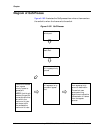
-2
Chapter
Avaya P550R, P580, P880, and P882 Multiservice Switch User Guide, v5.3.1
Why implement QoS?
Purpose of QoS In a network that has time-sensitive traffic (VoIP) or bandwidth-
intensive traffic (real-time or near-real-time streaming-video), QoS
makes it possible for you to prioritize the time-sensitive traffic and
assign larger amounts of bandwidth to those applications that
require it.
VoIP traffic has relatively low bandwidth requirements, but cannot
tolerate latency or frame loss. Therefore, this traffic needs a high
priority to ensure its timely delivery. On the other hand, streaming
video is bandwidth-intensive but has large “jitter buffers” so can
tolerate some latency. Thus, you can assign streaming video traffic a
lower priority than voice, but must assign streaming video more
bandwidth than voice.
Prerequisites To successfully implement QoS, you must have a thorough
knowledge of the traffic patterns in the network. You need this
information to:
■ Classify traffic and assign it the required priority and bandwidth.
■ Identify the areas of the network where bottlenecks might
occur and that therefore need bandwidth limiting.
■ Identify the areas of the network where time-sensitive traffic is
being delayed and needs to be prioritized better.
Implementation
Example
An example of managing QoS across the network is to define traffic
classes and manage these on a network-wide basis. The four classes
and their priorities might look like those outlined in Table 6-137
* Note: For information about DSCP (DiffServ Code Point), see
“Diffserv” on page 10.
Table 6-137. Examples of Classes of Service
Service
Class
Priority DSCP
Value
Type of Traffic
Highest
Priority
7 56 Network Management
Traffic, OSPF, Spanning
Tree, etc.
Time Sensitive
Traffic
5 40 Real-time voice, video
conferences.
1 of 2


















